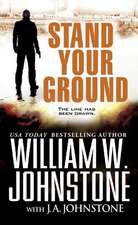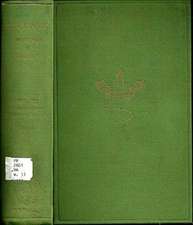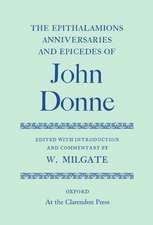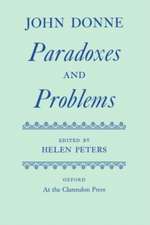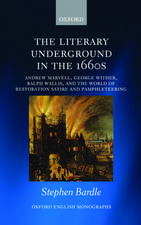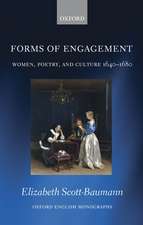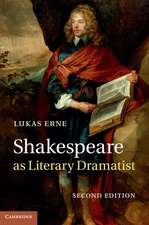William Percy's Mahomet and His Heaven: A Critical Edition
Editat de Matthew Dimmocken Limba Engleză Hardback – 28 iun 2006
Preț: 1054.71 lei
Preț vechi: 1286.24 lei
-18% Nou
Puncte Express: 1582
Preț estimativ în valută:
201.81€ • 211.28$ • 166.99£
201.81€ • 211.28$ • 166.99£
Carte tipărită la comandă
Livrare economică 05-19 aprilie
Preluare comenzi: 021 569.72.76
Specificații
ISBN-13: 9780754654063
ISBN-10: 0754654060
Pagini: 266
Dimensiuni: 156 x 234 x 16 mm
Greutate: 0.45 kg
Ediția:1
Editura: Taylor & Francis
Colecția Routledge
Locul publicării:Oxford, United Kingdom
ISBN-10: 0754654060
Pagini: 266
Dimensiuni: 156 x 234 x 16 mm
Greutate: 0.45 kg
Ediția:1
Editura: Taylor & Francis
Colecția Routledge
Locul publicării:Oxford, United Kingdom
Cuprins
Contents: Introduction: Play and playwright; The Qu'ran, the Bible and religious polemic; Portraying 'Mahomet'; Alchemy and the occult; Unravelling the playscript: I. Textual history; II. Sources and performance; 'Strange and wayward'? A note on this edition. Mahomet and His Heaven; Textual variants; Explanatory notes to the play; Appendices; Bibliography; Index.
Recenzii
'Matthew Dimmock's stated aim is to recover Mahomet and His Heaven "for any consideration of early English mythologies of Islam and the Prophet Muhammad". It is a task he performs admirably - his edition contributes to an important and growing field of scholarship. But theatre history, too, has seen significant development, and the play has much to offer on this front. Perhaps especially because it is unlikely to see production, scholarly attention to this text's exceptional focus on performance remains a necessary task.' Times Literary Supplement ’Dimmock's editorial skills are admirable. His introduction places the work in proper, historical, cultural and theological context. ... All things considered, the play is of paramount importance for any consideration of representations of Islam in the Renaissance, especially for those who want to look at the complexities of presenting Islam as a faith on the English stage.’ Modern Language Review ’Matthew Dimmock’s new edition of William Percy’s play Mahomet and His Heaven (1601) represents a crucial step in the rehabilitation of a significant seventeenth-century author. ... Dimmock duly makes use of Clayton Joseph Burns’s unpublished work on this very play. His new study is, nevertheless, the first scholarly edition of any of Percy’s works to appear in print. Reading both the play itself and the rich and stimulating scholarly apparatus supplied by the editor”including an introduction and explanatory notes spanning about sixty pages each”one can only wonder that the process has taken so long.’ Huntington Library Quarterly ’As with his influential study New Turkes, Dimmock’s critical and historical acumen make this valuable and timely book essential reading for students and scholars interested in understanding early modern imaginings of Islam.’ Sixteenth Century Journal
Notă biografică
Dr Matthew Dimmock is Lecturer in English at the University of Sussex. His previous publications include New Turkes: Dramatizing Islam and the Ottomans in Early Modern England (Ashgate, 2005) and Cultural Encounters Between East and West, 1453-1699 (Cambridge Scholars Press, 2005), co-edited with Matthew Birchwood. He is currently working on a book-length study of the Prophet Muhammad in Christian thought and iconography.
Descriere
William Percy's Mahomet and His Heaven (1601) - roughly contemporary to Shakespeare's Othello - is the only known play of the early modern period to place the Prophet Mohammad on the stage. The play takes place in around the mosques of 'Mecha' and the action mirrors parts of the Qur'an, the Islamic holy text that was rarely available in England at the time. Matthew Dimmock presents here the play in its entirety, with a critical introduction which introduces some of the key themes of the play, and its textual and social context. A section of detailed explanatory scholarly notes follow the play, with a full translation of the short Latin sections and a reference to any political or literary parallels. This book should be required reading for historians and literary scholars dealing with notions of 'race' and 'religion' in early modern England.

